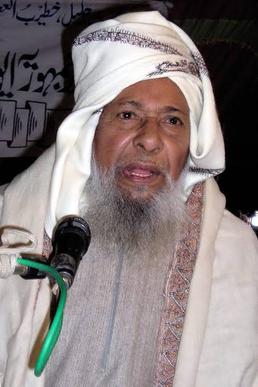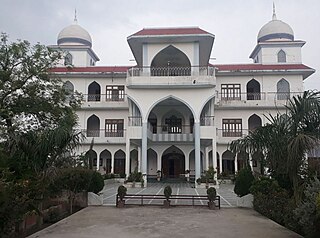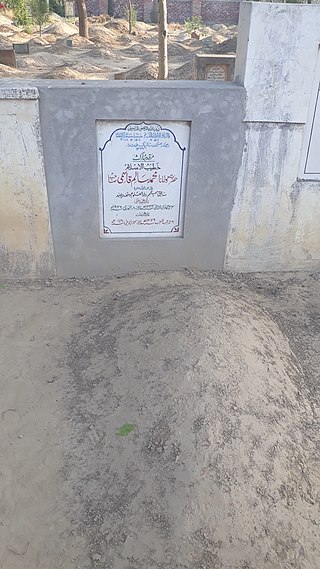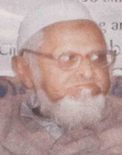
Muhammad Qasim Nanautavi was an Indian Sunni Hanafi Maturidi Islamic Scholar, theologian and a Sufi who was one of the main founders of the Deobandi Movement, starting from the Darul Uloom Deoband.

Anwar Shah Kashmiri was an Islamic scholar and poet from Kashmir in the early twentieth century, best known for his expertise in the study of hadith, a strong memory, and a unique approach to interpreting traditions, as well as the fourth principal of Darul Uloom Deoband. With an ancestral heritage of religious scholarship rooted in Baghdad, he acquired training in Islamic sciences at Darul Uloom Deoband under the mentorship of Mahmud Hasan Deobandi, alongside enjoying a spiritual journey with Rashid Ahmad Gangohi. Initiating his vocation as the first principal of Madrasa Aminia, he embarked on a hajj in 1906 with a sojourn in Medina, dedicated to exploring the depths of hadith literature. Subsequently, he joined Darul Uloom Deoband, serving as the post of Sheikh al-Hadith for nearly thirteen years before choosing Jamia Islamia Talimuddin as his final destination for his academic voyage. Although he displayed limited inclination toward the written word, a handful of treatises flowed from his pen. Yet, the bulk of his literary legacy has been preserved through the efforts of his students, who transcribed his classroom lectures, discourses, and sermons. While the crux of his scholarly work centered on championing the Hanafi school and establishing its supremacy, he also garnered recognition for his comparatively liberal approach to various religious matters. His publications found their place under the patronage of Majlis-i Ilmi, a scholarly institution established in Delhi in 1929. His scholarly credentials received official endorsement with the publication of Fayd al-Bari, a four-volume Arabic commentary on Sahih al-Bukhari, curated by Badr-e-Alam Mirati and published in Cairo, with the financial support of Jamiatul Ulama Transvaal.

Mazahir Uloom is an Islamic seminary located in Saharanpur, Uttar Pradesh. Started in November 1866 by Sa'ādat Ali Faqīh, and developed further by Mazhar Nanautawi and Ahmad Ali Saharanpuri; it is regarded as the second most influential and major Deobandi seminary in India. The earliest graduates of the seminary include famous Hadīth scholar Khalil Ahmad Saharanpuri. In 1983, the seminary split into two with the establishment of Mazahir Uloom Jadeed as a new independent seminary. Since then the seminary has been named as Mazahir Uloom Waqf Qadeem.
Muhammad Tayyib Qasmi was an Indian Sunni Islamic scholar who served as Vice Chancellor of Darul Uloom Deoband for more than half a century. He was grandson of Muhammad Qasim Nanautavi, the founder of the Darul Uloom Deoband.
Izaz Ali Amrohi was an Indian Islamic scholar who served as the second and ninth Grand Mufti of the Darul Uloom Deoband. His book Nafahtul Arab is taught in madrassas including the Darul Uloom Deoband.

Anzar Shah Kashmiri (1927-2008) was an Indian Islamic scholar who established the Jamia Imam Anwar Shah and co-founded the Darul Uloom Waqf in Deoband. He was an alumnus of the Darul Uloom Deoband. He was youngest son of Hanafi scholar Anwar Shah Kashmiri.

Jamia Imam Muhammad Anwar Shah is an Islamic seminary situated in Deoband, Saharanpur, Uttar Pradesh.

Muhammad Salim Qasmi Siddiqi was an Indian Muslim scholar who co-founded the Darul Uloom Waqf in Deoband and served as its first rector. He was an alumnus of Darul Uloom Deoband. He received the fourth Shah Waliullah Award and was honoured with the Mark of Distinction from Egypt.
Muhammad Sufyan Qasmi Siddiqi is an Indian Sunni Muslim scholar and current rector of Darul Uloom Waqf, Deoband.
Saeed Ahmad Akbarabadi was an Indian Islamic scholar and an Urdu-language author who co-founded the Nadwatul Musannifeen. He served as the dean of the Faculty of Theology in Aligarh Muslim University.

Azhar Shah Qaiser (1920–1985) was an Indian Islamic scholar, journalist and writer. He wrote articles and books in Urdu. He was the elder son of the Indian hadith scholar, Anwar Shah Kashmiri. During his career, he served as the editor of Darul Uloom, the monthly journal of Darul Uloom Deoband.
Hafiz Muhammad Ahmad (1862-1930) was an Indian Muslim scholar, who served as the Vice Chancellor of the Darul Uloom Deoband for thirty five years. He was the Grand Mufti of the Hyderabad State from 1922 to 1925.
Aziz-ul-Rahman Usmani was an Indian Sunni Muslim scholar who served as first Grand Mufti of Darul Uloom Deoband. He is best known for his Fatawa Darul Uloom Deoband. His brother was Shabbir Ahmad Usmani.

Zafeeruddin Miftāhi was an Indian Muslim scholar and jurist who served as a Mufti of Darul Uloom Deoband and the second president of Islamic Fiqh Academy. He compiled the religious verdicts of Azizur Rahman Usmani, called the Fatāwa Darul Uloom Deoband in twelve volumes and wrote books including Islām Ka Nizām-e-Masājid, Islām Ka Nizām Iffat-o-Asmat and Tārīkh-e-Masājid.
Hāmid al-Ansāri Ghāzi was an Indian Muslim scholar, author and a journalist, who co-founded the Nadwatul Musannifeen and served as the editor of bi-weekly newspaper Madina. He was the son of Muhammad Mian Mansoor Ansari and an alumnus of the Darul Uloom Deoband, Jamia Islamia Talimuddin and University of the Punjab. He was a member of the executive council of Darul Uloom Deoband and authored books such as Islām ka Nizām-e-Hukūmat and Khulq-e-Azeem.
The Usmani family of Deoband are the descendants of the third Rashidun Caliph, Uthman, based primarily in the town of Deoband in India. The notable people of this family include Fazlur Rahman Usmani, Mahmud Hasan Deobandi, Azizur Rahman Usmani and Shabbir Ahmad Usmani.
The Siddiqi family of Nanauta are the descendants of the first Rashidun Caliph, Abu Bakr, based primarily in the town of Nanauta in India. The notable people of this family include Mamluk Ali Nanautawi, Muhammad Qasim Nanautawi, Muhammad Yaqub Nanautawi, Muhammad Tayyib Qasmi and Muhammad Salim Qasmi.

Ghulam Nabi Kashmiri was a Kashmiri Muslim scholar and jurist who served as the senior professor of hadith at Darul Uloom Waqf. He also taught hadith at Jamia Ziya al-Uloom and Jamiat al-Tayyibat in Poonch. He was among the early graduates of Darul Uloom Waqf and authored books such as Hayat-e-Tayyib, a biography of Muhammad Tayyib Qasmi.
Sayed Sirajussajidin Katki was an Indian Islamic scholar, poet, and orator. He dedicated almost his entire career to Jamia Islamia Markazul Uloom, Sungra. He also served as the 4th President of Jamiat Ulama Odisha and the second Amīr-e-Sharī'at of Imārat-e-Shar'ia, Odisha.









